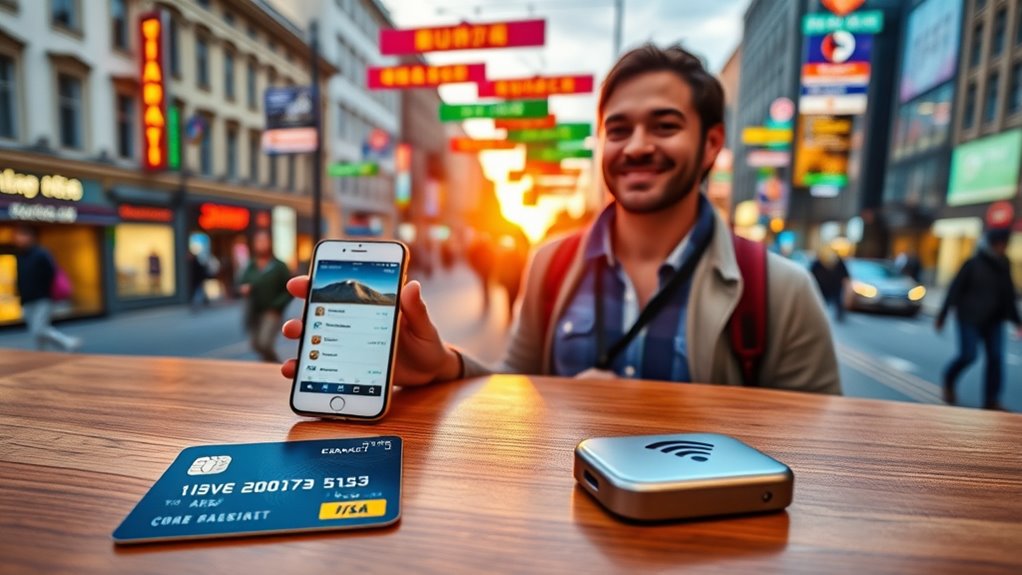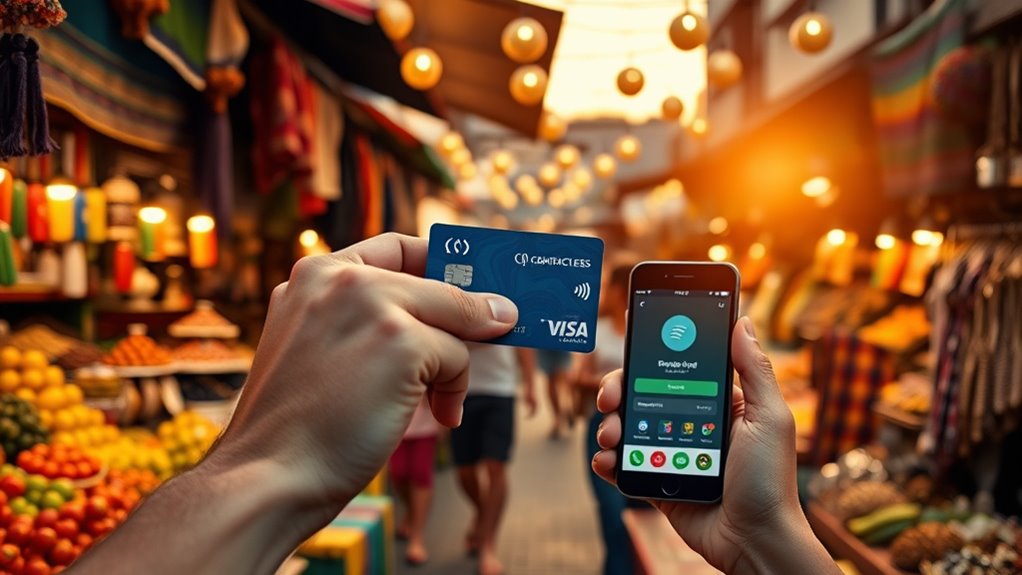To avoid foreign transaction fees abroad, choose a credit or debit card that waives these fees, especially one labeled travel-friendly. Always pay in the local currency when prompted to benefit from actual exchange rates and refuse Dynamic Currency Conversion offers, which often include extra charges. Carry multiple payment options, including such cards and cash, and notify your bank of your travel plans. Keep these strategies in mind, and you’ll find it easier to save on your trip expenses.
Key Takeaways
- Use credit or debit cards specifically labeled as travel or no-foreign-transaction-fee cards.
- Always pay in the local currency to avoid Dynamic Currency Conversion fees.
- Decline offers to pay in home currency when prompted by merchants or ATMs.
- Notify your bank about your travel plans to prevent card holds or fraud alerts.
- Carry multiple payment options, including fee-free cards and local cash, for flexibility.
Choose the Right Credit Card for International Travel

When traveling abroad, selecting the right credit card can save you a lot of money on foreign transaction fees. Look for cards that explicitly state they waive these fees, often labeled as travel or no-foreign-transaction-fee cards. These cards typically don’t charge the standard 3% fee on purchases made outside your home country. Choose a card that offers rewards or cashback for travel-related spending, which can help offset costs. Also, verify the card has broad acceptance in your destination, especially if you’re heading to countries where Visa or Mastercard are preferred. Finally, check for additional benefits like travel insurance or purchase protection. Picking the right card beforehand ensures you avoid unnecessary fees and enjoy smoother transactions abroad. Understanding credit card features can help you make the most informed choice for your travel needs.
Use Local Currency for Transactions

Using the local currency for your transactions can substantially reduce extra charges during your trip. When you pay in the local currency, your bank or credit card provider processes the payment at the actual exchange rate, often resulting in lower fees. Avoid letting merchants or ATMs convert the currency for you, as this often involves Dynamic Currency Conversion, which usually includes higher markups. Always choose to pay in the local currency when prompted. This simple step guarantees you’re not paying inflated rates or unnecessary fees. Before traveling, check your card settings to ensure transactions are set to be processed in local currency. Vetted – Mother Baby Kids Additionally, using a card that minimizes foreign transaction fees can further enhance your savings. By doing so, you maximize savings and keep your expenses clear, making your trip more budget-friendly and straightforward.
Avoid Dynamic Currency Conversion Offers

Avoid falling for Dynamic Currency Conversion offers, as they often come with hidden costs. When a merchant or ATM presents you with the option to pay in your home currency instead of local currency, resist. While it might seem convenient, DCC usually includes unfavorable exchange rates and extra fees that inflate your bill. These offers are designed to make you think you’re getting a better deal, but in reality, you pay more. Always choose to pay in the local currency. Your bank or credit card issuer generally offers better exchange rates and fewer fees, saving you money. Before making a purchase or withdrawing cash, double-check the currency options and decline DCC to avoid unnecessary charges. Staying vigilant helps keep your travel costs under control. Additionally, understanding the risks associated with merchant services can help you avoid unexpected charges and security issues. Being aware of the trustworthiness of payment providers, such as verifying their credentials and reputation, can further protect you from potential scams or hidden fees. For example, selecting reliable financial institutions reduces the likelihood of encountering fraudulent schemes or unfavorable terms. Moreover, being informed about security features offered by your bank can add an extra layer of protection against fraud.
Opt for No-Foreign-Transaction-Fee Debit Cards

Opting for a no-foreign-transaction-fee debit card can substantially reduce your travel expenses. These cards waive extra charges that banks often add when you make purchases abroad, saving you money on every transaction. By choosing one, you avoid the common pitfall of hefty foreign fees that can quickly add up during your trip. To maximize benefits, look for cards that also offer favorable exchange rates, easy access to ATMs, and no annual fees. Incorporating a Self-Understanding approach can help you select the best card suited to your personal spending habits and travel needs. Additionally, being aware of Relationship dynamics, such as open communication and understanding your own financial preferences, can aid in making informed decisions about your spending and card choices while abroad. Choosing a card with Exchange Rate features or technology is not relevant here but understanding your own financial environment can help you avoid unnecessary fees.
Prepare in Advance With Travel-Friendly Payment Tools

Preparing your payment tools before traveling guarantees you avoid unexpected charges and hassle on the go. Start by notifying your bank about your trip to prevent holds or freezes on your accounts. Carry multiple payment options, including a no-foreign-transaction-fee credit card and a backup cash supply in local currency. Consider downloading travel-friendly apps that allow you to manage your accounts easily and monitor transactions in real-time. Check if your cards have international acceptance and avoid relying solely on a single payment method. Bring a portable charger to keep your devices powered, ensuring you can access digital wallets or banking apps when needed. Being aware of juice cleansing options can help you feel more confident and prepared during your trip. Planning ahead minimizes surprises, saves you money, and helps you enjoy your trip without financial stress. Familiarizing yourself with forex rates can also help you better understand your expenses and avoid unfavorable conversions. Additionally, understanding the different types of home security systems can ensure you choose the most suitable and cost-effective security measures for your stay.
Frequently Asked Questions
Do All Credit Cards Have Foreign Transaction Fees?
Not all credit cards have foreign transaction fees. Many cards designed for travel or premium use waive these fees to save you money abroad. Before using your card overseas, check its terms or contact your issuer. You might find some cards with no foreign transaction fees, which helps you avoid extra charges on purchases. Always review your credit card agreement to understand any potential fees before traveling.
Can I Use My Mobile Payment Apps Abroad?
You can use your mobile payment apps abroad, but it depends on the app and the country. Many apps like Apple Pay, Google Pay, and Samsung Pay work in regions with compatible terminals. Make certain your device has internet access and your app is set up properly. Check if your bank or card issuer supports your mobile payment app internationally to avoid any issues at checkout.
Are There Any Countries With No Foreign Transaction Fees?
Think of traveling as sailing across diverse waters—you want smooth sailing, not stormy fees. Some countries, like Japan and Switzerland, often have no foreign transaction fees on certain credit cards. Always check your card’s policies before you set sail. By choosing the right card, you can avoid extra charges, making your trip more enjoyable and budget-friendly, just like finding calm seas amid the waves.
How Do Currency Exchange Rates Affect My Transactions?
Currency exchange rates directly impact your transactions because they determine how much your money is worth in a foreign country. When rates are favorable, you get more local currency for each dollar, saving you money. Conversely, unfavorable rates mean you spend more. You should monitor these rates before making purchases or withdrawing cash, and consider using credit cards with no foreign transaction fees to minimize extra costs.
What Should I Do if My Card Gets Declined Overseas?
If your card gets declined overseas, first, don’t panic. Check if your card is active and has available funds. Contact your bank or card issuer immediately to confirm there aren’t any restrictions or suspected fraud alerts. Inform them of your travel plans to avoid future declines. Carry a backup payment method, like cash or a second card, for emergencies. Staying proactive helps guarantee smooth transactions during your trip.
Conclusion
By choosing the right cards and sticking to local currencies, you hold the key to unleashing smooth sailing abroad. Think of your payment methods as a trusty compass, guiding you past hidden fees and tricky conversions. With a little prep and smart choices, you’ll navigate foreign transactions like a seasoned traveler, turning potential pitfalls into seamless adventures. So, gear up wisely—your wallet’s journey around the world should be as effortless as a breeze on a sunny day.









